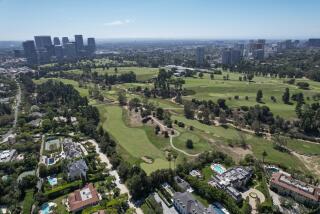If Syrian Builds It, Will They Golf?
- Share via
DAMASCUS, Syria — A scenic, grassy championship golf course boasting more than 20,000 trees, four lakes and a computer-guided watering system sounds like a perfect place for golfers around the world to spend a relaxing day.
But before calling the pro shop to reserve a tee time, you may need to make plane reservations.
Cham Golf and Country Club, which opened Sept. 29, is the first golf club in Syria, a nation of 17 million people--and few golfers.
“Today, we have an activity that didn’t exist here before,” said club owner Osmane Aidi, one of Syria’s most prominent entrepreneurs. “There’s been a lot of demand for such a club.”
In the first few days after the opening, more than 40 people signed up for membership, which costs about $1,500 a year. Most of the new members are foreigners working for companies or embassies.
“We got bored with the course in Beirut and wanted to try this one,” said Lebanese Ali Zaatari, a 21-year-old who drove to Syria with his friends recently to play.
“We found out that this is more beautiful, its design is more professional and the quality of the grass is better,” he said. “We’re definitely coming back.”
The club can handle about 800 members, and visitors who stay at the hotel can take advantage of a package deal: $129 a night covers the room, half board and green fees.
But Aidi is not just hoping to draw golf tourists to his new course; he also wants Syrians to learn to play.
Cham has one Algerian and two Tunisian golf instructors, and there are plans for a golf academy for children ages 4 to 17. A pro shop on the grounds sells American and Scottish golf equipment and locally made caps, polo shirts and towels bearing the club’s logo--three intertwined Cs.
Aidi first thought about establishing the club in 1989, when Syria’s socialist economy was still closed and private investment rare. He discussed the idea with the late President Hafez Assad, who “encouraged me to go ahead with it,” Aidi said.
Six years later, Aidi began work on the 148-acre course, which is attached to one of his 19 hotels and resorts and is 11 miles from the center of Damascus, the capital.
He brought in U.S. and French experts to make sure every detail of the 18-hole, par-72 course complied with international standards.
Some 650,000 cubic yards of agricultural soil were trucked in to transform the once flat land into a rolling golf course. About 1,000 palm trees, 3,000 olive trees, 15,000 fruit-bearing trees and thousands of other trees and flowers were planted to “make the players feel at peace while they play,” Aidi said.
Water feeding the four lakes--each with a fountain in the middle--comes from a water treatment plant at the five-star hotel.
A sleek, squat building with a marble facade serves as a country club. It consists of a sunken area with comfortable couches and a skylight, a dining room, a pool hall and carpeted changing rooms with wooden lockers.
Tunisian greenskeeper Saber Mami monitors a computer attached to a weather forecasting system that allows him to compute how much water has evaporated, how much rain has fallen and how much water the grass needs to remain green.
More to Read
Sign up for The Wild
We’ll help you find the best places to hike, bike and run, as well as the perfect silent spots for meditation and yoga.
You may occasionally receive promotional content from the Los Angeles Times.






